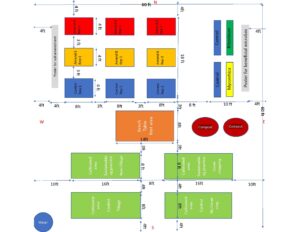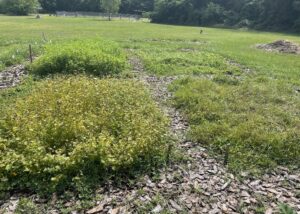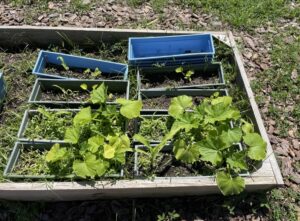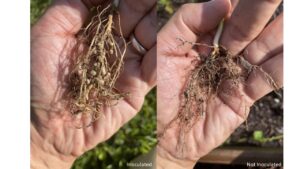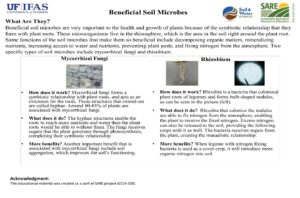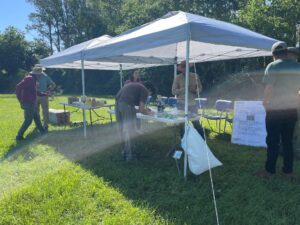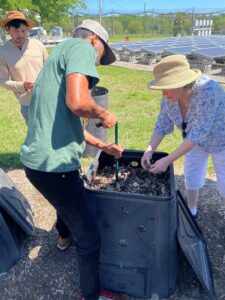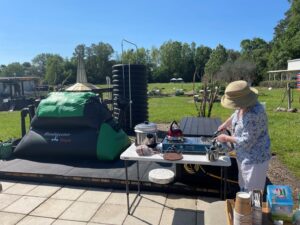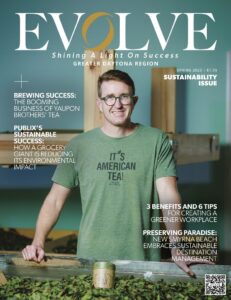Final report for EDS19-10
Project Information
Multiple aspects of farming practices and operations need to be optimized simultaneously and coherently to make food production sustainable. Productivity needs to be maintained while soil nutrients, water quality and farm waste need to be managed properly to mitigate negative impacts of farming on the surrounding ecosystems, so people in the next generations continue to receive ecosystem services. Though often ignored due to their intangible nature, microorganisms play important roles in agriculture by facilitating growth of plants via symbiotic interactions, maintaining the water quality of receiving water bodies, and converting farm waste into renewable energy and nutrient-rich biofertilizer. The microbial processes are natural rather than synthetic, mediating long-lasting interactions between nutrients, plants, and soils.
In this proposal, the PI and co-PI will conduct an education program on the vital roles of microbes in sustainable agriculture. Topics covered will include microbes involved in the nitrogen cycle, the phosphorus cycle, mycorrhizal fungi, and microbes that are involved in anaerobic digestion and composting of farm waste. The targeted audience will be local and regional small-scale farmers, who are likely to adopt sustainable farming practices. This education program will allow farmers to learn methods to sustainably fertilize and improve soils using naturally occurring materials and processes, the concept that over fertilization or irrigation may pollute groundwater or reservoirs, and skills about waste conversion into renewable energy and biofertilizer, which make farming operations more sustainable.
A total of 12 sessions of the education program will be hosted over the two year period by the PI and co-PI at the Energy Research and Education Park in Gainesville, FL, and that three Research and Education Centers in the state of Florida. The education program will be conducted on a hands-on basis. Farmers will learn the microbial process through visualization including observing red-colored leghemoglobin in nodules of legume plants, and observing hyphae of mycorrhizae on the root areas through a microscope. They will also observe differences in plant growth with mycorrhizae vs. w/o mycorrhizae, or the biofertilizer application vs. w/o biofertilizer. The treated and controls plots will be created prior to the sessions. Biogas from anaerobic digestion of farm wastes will be visualized by flaming using a Bunsen burner. We will also create an educational website regarding microbes that are utilized in sustainable agriculture. We will create infographics that summarize the role of microbes in sustainable farming and post them on the website. Videos that capture highlights of our educational sessions and testimony of participants will be created and posted on the website. The link to the website will be disseminated and will be used to recruit farmers. We believe that education through hands-on experiences and visualization is the most effective way to transfer knowledge and skills, and also to motivate people who receive the information.
- To make intangible microbial processes tangible (mycorrhizal fungi, nitrogen-fixing bacteria, and microbes in an anaerobic digester), so farmers can comprehend the essential roles of microbes in sustainable farming processes.
- To show farmers that natural processes with the help of symbiotic microbes will increase productivity relative to control (without microbial symbiont).
- To teach the benefits of natural sustainable processes compared to agricultural practices that could potentially harm our surrounding ecosystem, through this microbial-based exercise.
Educational & Outreach Activities
Participation Summary:
SARE Annual Report
Project Title: Harnessing Microbes for Sustainable Food Production
Project Number: LS19-308
PI: Masanori Fujimoto
Co-PI: Ann C. Wilkie
The main goal of the project was to educate farmers about the roles of microbes in sustainable agriculture and to make important yet intangible microbial processes more tangible through educational sessions. For the past 14 months (since May 2020), we transitioned to online-based education through a webinar series due to the COVID pandemic. 6 webinars regarding microbes that are utilized in sustainable agriculture were given including three webinars in fall 2020 and 3 webinars in spring 2021. The webinar contents included visual images and information on beneficial soil microbes and their functions associated with crop production. The webinar also included how various sustainable agriculture practices (i.e. cover crop, crop rotation, no-till, organic soil amendment) help enrich such beneficial soil microbes. As participants in the first several workshops requested some additional content on sustainable pest management, we added content regarding biological soil disinfection (bio-fumigation) and anaerobic soil disinfection, specifically focusing on how microbial populations respond to such practices (see attached powerpoint slides in pdf format). In addition, the webinars included stories of farmers in Florida and a few other states who successfully transitioned from conventional agriculture practices to more sustainable and innovative farming techniques that improved nutrient management and mitigated negative environmental impacts (see attached powerpoint slides in pdf format).
To recruit farmers for the webinar series, we obtained contacts of over 1,200 local and regional farmers (since we have access to remote farmers through webinars) mostly through communicating with local extension agents or searching independently via web-based searches. We also communicated with PIs who previously held SARE grants in UF and Florida A&M regarding the recruitment. The contacts were gathered from 60 counties out of 67 counties that are present in the state of Florida. Out of 1,200 contacts, we reached out to nearly 760 farmers via emails and asked if they are interested in participating in the educational webinar series. 42 farmers out of 760 farmers responded to the emails and showed interest in participating in the webinar series.
For the 6-webinar series, 26 people participated altogether averaging 4.3 participants per webinar. We assessed the effectiveness of the educational seminars through poll functions in zoom. The feedback we received was mostly positive. Out of 26 participants, 14 attendees participated in the post webinar evaluation and 93% (13 out of 14) attendees felt that the webinar was effective (50% very effective, 43% effective to some extent).
Though we received positive reviews from our participants, we also believe that in-person educational sessions that were originally planned prior to the pandemic will be more effective, specifically those involving hands-on experiences, as opposed to webinars that rely on electronic materials. We also believe that farmers would be more excited to participate in on-site educational sessions rather than workshops given via zoom webinars. We are expecting that we can resume in-person gatherings in the field site by Fall 2021 and we can safely provide in-person educational sessions in the field as originally planned, as the number of covid-19 cases in the state of Florida has been declining over the past 3 months. Moreover, more people in the state are vaccinated on an everyday basis. We plan to offer 6 on-site educational sessions at the SARE designated field site in Gainesville (see Figure 1 and Figure 2) from Fall 2021 through Spring 2022. We will also continue to develop and enrich electronical education materials on our website (URL: https://programs.ifas.ufl.edu/sare/). We are also open to continue to offer webinars to farmers in distant counties who showed interest in participating in our educational program.
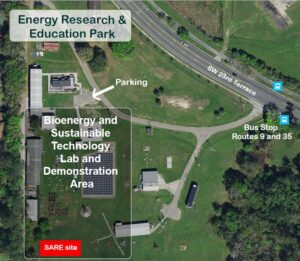
Figure 1. Location of SARE site within the Bioenergy and Sustainable Technology Laboratory Field Research and Demonstration Area, Gainesville, FL
Figure 2. Outline of SARE Field Site
Webinar Materials
SARE_Microbe_Webinar_Materials_Feb18
Success Stories
Farmer Success Stories Feb 2021
Farmer Success Stories Nov 2020
Resources
Book recommendation
Online Materials
https://programs.ifas.ufl.edu/sare/
News Article Published
https://citrusindustry.net/2020/11/13/harnessing-the-power-of-soil-microbes/
Creating SARE Field Site
From 2022 through 2023
Over the last one year (since April 2022), our SARE team was engaged in improving and enriching our online materials related to the “harnessing microbes for food production” theme and focused on developing field plots for in-person field day. As previous students hired for this SARE program graduated at the end of spring/summer 2022, two new undergraduate student assistants from horticulture and plant science majors were hired in the fall of 2022. One student was hired primarily for field plot development/management and the other was hired for website development / maintenance and lab work, which included DNA extraction from composted farm wastes. We also had one student volunteer for this project, who helped mostly with field work.
For the field days that were planned in spring 2023, students prepared several plots to explain the role of cover crops on enrichment of soil microbes. Winter cover crops were planted in our plots, which included winter rye (grass), buckwheat (psudo-cereal), sunn hemp (legume) and hairy vetch (legume) (Figure 3). Students also prepared garden pots that show the impact of compost amendment on plant growth by preparing both compost amended pots and non-amended pots (Figure 4). Students also planted several vegetables in raised beds including sweet corn, green beans, green peas, tomatoes, squash, radish and some others. In one raised bed, legumes (green beans) were inoculated with rhizobium and in the other bed, legumes were planted without inoculants to show the effect of inoculation on nodule formation (Figure 5: Inoculated and non-inoculated legumes).
Figure 3. Plots of winter cover crops
Figure 4. Compost amended pots and controls
Figure 5. Nodule formation of leguminous plants
Students also created a poster that describes and depicts beneficial soil microbes and their role in plant growth for the field day (Figure 6). In the poster, beneficial soil fungal organisms such as saprotrophic fungi (that serves as a key player in degradation and mineralization of organic matter), and arbuscular mycorrhiza fungi (that directly associates with plant roots and serves as a plant symbiont by fetching nutrients and water through hyphae structure) were featured. Other bacterial symbionts such as rhizobium that fix atmospheric nitrogen were also described in the poster with photographic images.
Figure 6. Beneficial Soil Microbes Poster
From February 2023, we started recruiting farmers for field days through emails. We contacted over 700 farmers in 6 counties adjacent to Gainesville/Alachua country, where the University of Florida campus is located. Out of 761 farmers we contacted through personalized emails, we received responses from 33 farmers; most of the responses indicated that they are interested in attending workshops.
The field day was held on Thursday the March 30th, 2023. A total of six people participated in the field day, including four farm owners, one farm volunteer and one biotech company scientist from the Orlando area. Two farmers participated from Talahassee, FL and others came from the nearby counties. All participants actively participated in the following activities during the field day; hands-on activities with microscope, poster (beneficial microbes), soil amendment with compost, and farm waste management using compost and anaerobic digestions (AD).
For the hands-on activities with microscopes, participants first checked the nodule development of hairy vetch and sunn hemp, leguminous plants, in our plots. When they found the nodule formations in roots of these leguminous plants, participants removed the nodules from the roots and ground them using a pestle in an Eppendorf tube. Participants observed the pink color (leghemoglobin) that was found in the ground nodule (host plants provide leghemoglobin in nodule, so the oxygen concentration in the nodule adjusted for nitrogenase that is used for nitrogen fixation). The ground nodule was placed on a glass slide and the presence of microorganisms (rhizobium) was observed under a microscope (see Figure 7).
Figure 7. Microscope station for hands-on activities.
Participants also learned how to make compost from organic wastes during the field day. We normally make compost from farm wastes including livestock feces and crop residues and/or organic food waste that are brought by students who live on campus of the University of Florida. Participants mixed compost and felt heat that comes out of the compost (Figure 8). Participants also sieved composted materials, as each composting process makes organic matter smaller. We explained how microbes are involved in composting processes.
Figure 8. Participants learning composting processes through hands-on experiences
We also demonstrated that anaerobic digestion (AD) can convert organic farm wastes into valuable resources, i.e. biogas. We served a hot tea that was heated using the biogas from AD to the participants (Figure 9). Benefits of having on-site anaerobic digesters were discussed with the participants and practical information about operation of anaerobic digesters as well as the role of microbes in digester function was shared with the participants.
Figure 9. Making a hot tea using biogas generated by on-site anaerobic digestion of organic wastes
After the workshops, we conducted survey to evaluate the efficacy of the workshop education program. Four out of 6 participants completed the post-workshop survey. Those who completed the survey all agreed that the workshop was very effective. They all provided positive feedback about the workshop indicating that they learned about beneficial soil microbes and that they are now more interested in sustainable agriculture after participating the workshop.
Though the field day was successful, one challenge we encountered was recruiting farmers for these workshops. We tried several ways to recruit farmers including phone calls, sending personalized emails, sending flyers, and announcing workshops through media. We received RSVPs from farmers, however only 20% of farmers who responded yes to the invitation actually showed up to those workshops.
The other thing we focused on this past year was to continue to develop our online education materials. The website has been updated and contents have been added throughout the funding periods. The website now consists of 4 main sections- Education Materials, Tools and Resources, Success Stories, and Workshops. The Education Materials section now covers the following 10 topics: Agricultural Practices & Water Quality, Agricultural Practices & Water Quality Part 2, Agroecosystem Concept, Plant Disease & Soil Disinfection, Sustainable Farm Waste Management, Beneficial Soil Microbes, Soil Amendment, Soil Health Concept and Indicators, Soil Management Practices, and Sustainable Agricultural Practices & Microbes. Tools and Resources include funding information for farmers and other useful information related to sustainable agriculture. For success stories, we feature 5 Florida local farmers and their success stories. Please see the following link for more information (https://programs.ifas.ufl.edu/sare/).
Our team also conducted research to identify microbes that are involved in compost and anaerobic digestion that are fed with organic farm waste. This information is going to be shared on the website with farmers who are interested in composting and anaerobic digestion of farm waste. For this research, we collected samples from both compost and anaerobic digestion that were decomposing organic farm waste in February 2023. Genomic materials were extracted from the samples and the extracted DNA was submitted to the University of Minnesota Genomic Center (UMGC) for sequencing in March 2023. We just received the sequencing data back from the UMGC (May 2023). The genomic sequencing data will be analyzed for bacterial compositions that are involved in both composting and anaerobic digestion, and a manuscript that summarizes our findings will be prepared and information about microbial compositions will also be shared with farmers on our website.
Our SARE funded project was also featured in the Spring 2023 issue of Florida regional business magazine called “EVOLVE” (Figure 10). EVOLVE magazine is one of the most popular business magazines in the state of Florida and our project was featured in the section on “Sustainable future of farming” (https://evolve-success.com/growing-green-the-sustainable-future-of-farming/). Through this magazine publication, we could reach out to local farming industries, other business owners and employees throughout the State of Florida.
Figure 10. EVOLVE magazine Spring 2023 ISSUE COVER
Overall, we reached out to more than 1,000 regional farmers throughout the funding periods, and 34 people attended in our educational sessions through either online workshops or the field day. The reviews we received through the post-workshop evaluations were very positive throughout the workshops we provided. The project was featured on one of the news articles and also featured on one regional business magazine. By using these media, we reached out to broader audience including small scale farmers, gardeners, business owners, and the general public. Throughout the project, a total of 9 undergraduate students were hired as student employees or student volunteers. Many of them are interested in sustainable agriculture and will stay in the field either as graduate students or as practitioners. We believe these students will be our future workforce in this particular field of research and education.
Learning Outcomes
Project Outcomes
We have established research and education collaboration with the field and fork group for the past few years through this SARE grant. I also started a small research collaboration with Dr. Zhao Xin at UF through this SARE grant.
